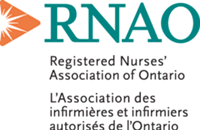RNAO says public inquiry into Elizabeth Wettlaufer's actions highlight systemic issues that must be remedied to protect residents in long-term care
TORONTO, Sept. 26, 2018 /CNW/ - Significant systemic issues in Ontario's long-term sector must be addressed by the Ministry of Health if it wants to ensure seniors in nursing homes are safe and secure.
That's the main thrust of a submission the Registered Nurses' Association of Ontario (RNAO) – the group that first called for a broad-based public inquiry – presented before Justice Eileen Gillese Wednesday as phase one of the Long-Term Care (LTC) Homes Public Inquiry wraps up this week.
RNAO was granted standing in the inquiry, which is examining the circumstances surrounding the murders, attempted murders, and aggravated assaults on nursing home residents by former RN Elizabeth Wettlaufer. The inquiry is looking at the specifics of her offences – which took place between 2007 and 2014 at three LTC homes in southwestern Ontario – as well as the systemic issues that may have contributed to the tragedy.
"Over the past few months we have been hearing testimony from witnesses and we have learned much about the systemic failings in our long-term care system and the shortcomings that allowed Wettlaufer to commit her offences undetected," says RNAO president Angela Cooper Brathwaite. "Our hearts are with the victims' families and we have kept them top of mind during this inquiry."
Critical changes that must be addressed are current funding and staffing models. Brathwaite says they negatively affect quality of care and resident safety. "Nursing homes are consistently understaffed, especially when it comes to regulated staff: RNs, NPs, and RPNs. Ontario seniors are being shortchanged by an archaic funding model that doesn't take into account today's realities." Brathwaite says more than 50 per cent of long-term care residents are 85 years or older and 90 per cent of all residents have cognitive impairments. Even worse, RNAO says current models of government funding unintentionally penalize nursing homes when they improve the health outcomes of their residents.
RNAO also has recommendations that call for clarifying the reporting obligations of nurses and nursing homes when it comes to issues of resident safety. Another area that requires attention is the protocol when a sudden or unexpected death occurs in a home. RNAO argues coroners should be mandated to complete a review, including an autopsy, if a member of a resident's care team at a nursing home recommends it. The association says this is essential since an RN and a physician recommended that autopsies be conducted on two of Wettlaufer's victims but in each case the coroner didn't act.
RNAO also wants employers mandated to disclose termination notices related to patient safety to prospective employers during reference checks.
Doris Grinspun, RNAO's CEO, says it is important that the public is aware that a majority of nurses provide safe, quality care to nursing home residents. "However, the reality is that many do so under extremely challenging staffing conditions, and that is what we are seeking to change."
Grinspun says implementing best practices will also raise the quality of care provided to residents.
"We are hopeful that the testimony we have heard to date will help bring about positive changes that will protect the health and safety of all nursing home residents. We also hope that measures are put in place with specific timelines so that when Justice Gillese makes her final recommendations, they will be fully implemented and not sit on a shelf in some ministry office. We owe it to the families of the victims of this horrific tragedy," adds Grinspun.
RNAO is the professional association representing registered nurses, nurse practitioners, and nursing students in Ontario. Since 1925, RNAO has advocated for healthy public policy, promoted excellence in nursing practice, increased nurses' contribution to shaping the healthcare system, and influenced decisions that affect nurses and the public they serve. For more information about RNAO, visit RNAO.ca or follow us on Facebook and Twitter.
SOURCE Registered Nurses' Association of Ontario

To arrange an interview, please contact: Marion Zych, Communications, Director, Registered Nurses' Association of Ontario (RNAO), 416-408-5605, 647-406-5605, [email protected]

Share this article